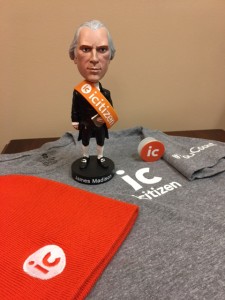NOTE: For week three of the #OpenLearning17 cMOOC, I was supposed to read Doug Engelbart, Augmenting Human Intellect: A Conceptual Framework (excerpts online). But I got sidetracked, as I often do, by other readings. Imagine my surprise, however, to find Englebart everywhere I looked.
I’ve been recently thinking about the relationship between open learning, digital citizenship, and political citizenship. At JMU, I’ve been leading efforts to advance the civic engagement of our undergraduates and I’ve been involved in digital humanities work in the College of Arts and Letters. These interests grow out of my training in American Studies and public history, both of which are interdisciplinary endeavors that seek to involve ordinary Americans in shaping a more accurate, more sophisticated understanding of our shared past. In case it isn’t evident, American Studies scholars and public historians alike have been actively engaged online, whether digitizing collections, hosting MOOCs, or blogging about their work. In fact, I was motivated to join the #openlearninghub in part because I wanted to learn from academics doing digital work in other fields. How, I wonder, can we leverage the positive human relationships that many people build online to foster effective participation in the traditional modes of politics that undergird our representative democracy?

icitizen swag surrounds my James Madison bobblehead. It’s a real-time, digital polling tool that facilitates open communication and collaboration between citizens and their elected leaders to shape the policies that affect their lives. https://icitizen.com/
The specific prompt was Autumm Caines’ blog post on digital citizenship (#digciz), which led me to her website and course syllabus. She argues that higher ed offers an important opportunity to help young people develop a better sense of their rights and responsibilities in digital environments. Her work put me in mind of another essay I was reading at the time, Joseph Kahne, Ellen Middaugh, and Danielle Allen, “Youth, New Media, and the Rise of Participatory Politics,” in From Voice to Influence (2015). All the evidence points to the growing power of digital networks for political organizing. Groups around the world are using new media, mobilizing applications like Twitter and Facebook to create protests as they did so effectively during the Arab Spring and the Women’s Marches. Evidence also indicates that young people are the ones most effectively using their digital networks for more than mere social interaction. They forward weblinks from Huffington Post, create and circulate political memes, like each others’ Instagram images, contribute to polls at icitizen, and sign online petitions at Move.org. Unfortunately, young people are also the most disengaged from traditional political life, even as they constitute the largest single demographic.
To better understand youth activity online (and my own geezer brand of activity, lol), I have turned to the work of Howard Rheingold, the man who seems to have coined the term virtual communities. In particular, his adaptation of the concept of the panopticon to the digital world affirmed my own concerns about corporate surveillance, but his argument for greater mindfulness in Net Smart is even more intriguing. For Rheingold, online networks are not only essential to our private success (and personal empowerment), but the public good. He says, “I believe that learning to live mindfully in cyberculture is as important to us as a civilization as it is vital to you and me as individuals.” (NetSmart, p1)
For me, the common thread for these writers is connected learning. I wasn’t at all surprised to see that Rheingold cited Doug Engelbart, for example, or to find Henry Jenkins’ work on participatory culture in both Rheingold and Allen et al. Caines, similarly, teaches Rheingold in her #digciz course and is co-director of VConnecting, a global initiative that hosts informal virtual meetings between people attending academic conferences and those who can not attend. I confess I’m still trying to figure out how all these individuals and their ideas and their activities intersect, but so far they have inspired me to put together a draft syllabus for a course called Citizenship in the Digital Age. I’ll put details in a future post. For now, though, here are some of the salient bits:
Potential Readings
Foundational documents like the Declaration of Independence, the Constitution, the Bill of Rights, Federalist 10; as well as court cases
American Studies texts like: Crevecoeur, What is an American?; Emerson, The American Scholar; DuBois
Essays by Danielle Allen, Howard Rheingold
Robert Putnam, Bowling Alone
For several years now, I’ve had students posting to a common course blog and/or creating their own web domains (Shout out to my fellow Virginians over at University of Mary Washington and the Domain of One’s Own project). So this course also will include social media and new tools associated with “civictech,” such as icitizen and Ballotready and Turbovote.
If you have good ideas for other readings and assignments, please let me know.
